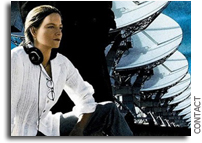Under-representation at Astronomy Conferences
 Studying Gender in Conference Talks: Data From 223rd American Astronomical Society Meeting
Studying Gender in Conference Talks: Data From 223rd American Astronomical Society Meeting
“The most significant result from this study is that while the gender ratio of speakers very closely mirrors that of conference attendees, women are under-represented in the question-asker category. We interpret this to be an age-effect, as senior scientists may be more likely to ask questions, and are more commonly men. A strong dependence on the gender of session chairs is found, whereby women ask disproportionately fewer questions in sessions chaired by men. While our results point to laudable progress in gender-balanced speaker selection, we believe future surveys of this kind would help ensure that collaboration at such meetings is as inclusive as possible.”









How does this work help the USA expore the Moon and Mars?
It doesn’t. The AAS (American Astronomical Society) meetings focus on discussions of astronomy and astrophysics. There is not much focus at these meetings on Lunar and Planetary exploration.
I will change the question to, “How does investigating the gender ratio of speakers help the USA perform astronomy and astrophysics?”
The purpose of meetings like the AAS is for scientists to come together and discuss the latest science research and to form plans for new studies and collaborations. For this to work well, there needs to be real engagement between the audience and the speakers (otherwise with might as well just read the papers at home).
I think that it is relevant to look at the factors that can influence engagement at these meetings, and thus identify ways to make these large meetings more effective. This will help the USA maintain leadership in astronomy and astrophysics. It looks to me that this is a study, by a group of volunteers, to look into the effect of gender. Will it make things better? I don’t know. But it didn’t cost us any money and it might make things better so I applaud the authors for being willing to spend their time to explore this.